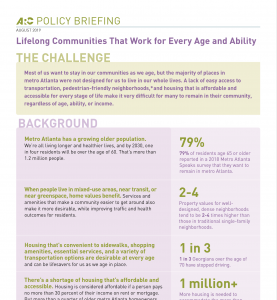When you feel passionately about an issue, whether it’s housing, transportation, the needs of caregivers, or something else that affects the lives of people who are aging or experiencing disabilities — a key thing to remember is that you can make a difference.
How do we do it? Advocacy. 
We can all learn to clearly communicate an issue and present real solutions to our decisionmakers. To help, ARC has developed a series of policy briefs to give you a communication blueprint about many of the challenges and opportunities related to our needs as we age.
These policy briefs are designed to provide a better understanding of the crucial issues impacting older people, people with disabilities, and their caregivers. They offer specific planning, policy, and programmatic solutions, and can be used by decisionmakers and advocates alike to make sense of and act on issues.
Here are some advocacy tips for working with people elected to represent you.
BEFORE THE MEETING
- Learn the names and contact information for your elected representatives:
Federal, State, & Local
If you are registered to vote in Georgia, enter your information at https://mvp.sos.ga.gov/s/ to find your elected officials and districts.
Federal
U.S. House of Representatives
Visit https://www.house.gov/representatives/find-your-representative to enter your zip code and find your congressional district and representative.
U.S. Senate
Visit https://www.senate.gov/general/contact_information/senators_cfm.cfm to select your state and find your U.S. Senators.
State
Visit https://openstates.org/ to enter your address and find out your districts and legislators.
County
Visit your county’s website to find contact information for your county commissioner(s).
City (if applicable)
Visit your city’s website to find contact information for your mayor and/or council member(s).
- Call the number listed for your representative, and make an appointment to see them.
- Research the official you’d like to visit. This means learning as much as you can about the person you are trying to influence — their party affiliation as well as policy and community interests.
DURING THE MEETING
- Present a positive image. The manner in which you present yourself is extremely important in forming a lasting impression and in developing a good rapport.
- Use the ARC policy briefing document(s) as the basis for your conversation. Express appreciation for any support on this issue the official has given in the past.
- Stay on topic. Confine your conversation as much as possible to the issue you made the appointment to discuss.
- Don’t argue. Try to avoid any prolonged or controversial discussion. It is better to leave the official undecided than committed against you. Someone else might be able to convince him or her.
- Don’t take notes during your meeting. Officials will be less forthcoming if they know their opinions are being recorded.
- Don’t interrupt. Allow the legislator to present his or her viewpoint fully. Be a good listener.
- Don’t alienate your elected official. Attempt to leave the legislator with a friendly feeling, even though you may disagree.
- If they are supportive, help them to be a “champion” to convince others of the need. Offer to help them with additional information, resources, and expertise.
- If they are opposed, move on. Do think about ways to neutralize their opposition.
- If they are undecided, figure out what they need to move them to your side — information, personal testimony, etc.
AFTER THE MEETING
- As soon as you finish, find a quiet place and make your notes – don’t depend on your memory.
- Send them an email or thank-you.
- Keep in touch with your legislator in the future; you may want to talk to them about other issues.
Lastly, remember that your vote matters. Make sure that you are informed of your rights to vote and participate in all elections.


